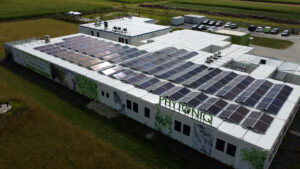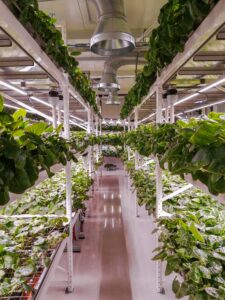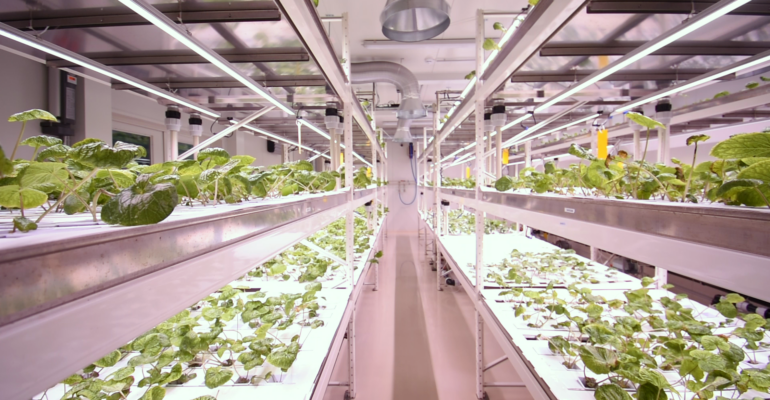AVF recently caught up with Martin Parapatits, Founder and CEO of PhytonIQ GmbH to hear more about Zelosplant Indoor Farming Solutions GmbH, their latest venture within the vertical farming industry.
– Who is Zelosplant Indoor Farming Solutions GmbH?
 Zelosplant is a company located in Austria, combining both engineering technology and plant development for vertical farms. We have been building indoor farms since 2018.
Zelosplant is a company located in Austria, combining both engineering technology and plant development for vertical farms. We have been building indoor farms since 2018.
Zelosplant is focusing on a full consultancy offer. So, we go with our customers on a journey, starting with the analysis of their problem(s), then assessing the planning and viability of the vertical farm concept for their chosen crops, and finishing by setting up and then establishing plant production within the vertical farm.
We specialise a lot on high-value crops – those that are difficult to grow – such as wasabi.
– What is unique about your technology/consultancy?
Our Expertise – Zelosplant is one of only a few companies with experience across setting up and running an indoor vertical farm. Our sister company PhytonIQ Wasabi has been running indoor farms growing wasabi since 2020. We have developed technology with a focus on delivering energy savings.
 Experience in Plant Cultivation – We have a development centre for plant cultivation and have experience in growing more than 70 different kinds of crops. We have grown six or seven crops in working/commercial farm settings and the rest of the crops we have grown in our lab. This means we have been, and are continuing to, collect valuable knowledge about crops. As a result, investors come to us because we they know can provide a brief overview in a short space of time of whether an indoor farming concept which they are looking to invest in is economically viable as a business.
Experience in Plant Cultivation – We have a development centre for plant cultivation and have experience in growing more than 70 different kinds of crops. We have grown six or seven crops in working/commercial farm settings and the rest of the crops we have grown in our lab. This means we have been, and are continuing to, collect valuable knowledge about crops. As a result, investors come to us because we they know can provide a brief overview in a short space of time of whether an indoor farming concept which they are looking to invest in is economically viable as a business.
Our key USPs are:
- Our ability to offer a complete package solution to enquiries about indoor vertical farms.
- Our expertise and knowledge that allows us to provide fast and accurate information to investors/builders assessing the viability/profitability of a project. We have a vast knowledge of commonly grown crops for vertical farms. And for high value or specialist crops, we have the expertise to provide an estimation. For example, for ginseng we can run our own growing trials and collect data as well as use the trials to further develop technology. In the trials we can bring in the technology from our holding system or from the watering system and take very fast steps to find a solution for the customer or advise quickly that the idea will not currently work (but may do in the future with new developments).
We are continually learning from the trials we undertake and analyse the data produced to improve technology and crops.
– Who is your technology/consultancy for?
Zelosplant works with a range of clients and customers:
Indoor Famers and Builders of Vertical Farms – Our services are also helpful for indoor farmers or builders of indoor farms who need a consultancy to help them plan an indoor farm and provide expertise for plant development. We can easily and relatively quickly show in the laboratory whether the yields they are looking for are possible from the chosen crop(s). We currently have a demonstration space to grow and test yields in 100-150 square metres.
We work with a variety of farm sizes and the size of the farm differs by region and by the kind of investor who is running the farm. In Asia, especially China and Korea they have much bigger farms and the set ups differ depending on whether investors are looking to export the produce or sell into local markets. So, we approach each market and business type differently.
Government and NGOs – we also see ourselves as a contact partner for Government and NGOs and any organisations who have questions about developing indoor farming. We can advise them on how to meet their goals in relation to indoor farming and how indoor farming can help them regionally.
We have received enquiries from outfits as small as 20 square metres, from one room farms, Universities, small microgreens farms all the way up to large farms with 20,000kg of crop yield.
– What is the potential of your business going forward?
The consultancy until the middle of last year mainly focussed on selling a complete indoor farm, including the building and construction. However, we pivoted to a more consultancy approach because it uses our expertise across the indoor farming industry. From October and November last year (2024) we saw more and more interest in vertical farming. After some time when it was difficult to access investment, I think now there is an increase in the availability of money to invest and develop new projects. Businesses are again looking more towards the future.
We also chose the consultancy approach because we wanted to expand the business internationally. Indoor farming in Europe only takes small steps at a time and so it is a long path and slower path that in other parts of the world, especially in Asia and Africa. In these two regions we see development comes very fast and is much more integrated. So there has been a focus in the last months on work in Asia and also a little in Africa.
– What are your goals in the future?
The main goal and focus for the future as a consultancy is to continue growing the international reach of the company outside of Europe and become recognised internationally for our indoor farming expertise.
We also want to see indoor farming become a natural and usual part of the agricultural sector. I think vertical farming will become a common part of agriculture. Over time it will become cheaper and cheaper. And we see ourselves helping farmers move some crops from in-field growing to greenhouse or taking them straight to indoor vertical farms.
At the present time around 90-95% of our enquiries come from businesses based on the land rather than urban areas. This is not a surprise because vertical farming will play a role in the supply of some vegetables. I think that indoor farms can produce more yield for some crops on less land than in-field farming. So, indoor farms will be situated on the land surrounding big cities and this is where the main food production will be. In urban centres the cost of real estate is too high, and this makes it very difficult to build big indoor farms there. Although there are the benefits to growing in the city – less transport costs is one – I think the big markets for vegetables etc grown indoors and using vertical farming will be located just outside big cities.
For some crops greenhouses are the solution but for others vertical farming is a better solution for growing crops. We are focussing on vertical farming and see the future in high value crops and some common vegetables – tomatoes, peppers, cucumbers – because climate change especially in Europe will bring change quite quickly. We are already seeing an increase in the extremes of temperatures, and it will increasingly make more sense to grow in indoor farms. We do recognise that indoor farming needs to become cheaper and easier (in terms of technology) for people to grow using vertical farms more easily.
In Austria we know that the age of farmers who own traditional farms is getting older and it is becoming more difficult to find seasonal farm workers to work the harvests. Vertical farming offers a more attractive possibility for work being available all year in a more pleasant and high-tech work environment.
– What are you looking for in the VF space -> which kind of collaborators?
We are looking to work with investors where we can help with economic analysis to assess the viability of investments. We are also looking for customers who want to build an indoor farm, and we think these people will come mainly from the agricultural industry. We will be able to walk alongside the farmers for the whole process from envisioning an indoor farm, testing the economic viability to building and running a profitable vertical farm.
We can help people working in the vertical farming sector with questions about vertical farming wherever they are in their vertical farming journey.
Africa – We have seen in the last 2 or 3 months in Africa the possibility of working in partnership with Government, which often happens when working with new technologies, and also possibilities to work with private companies and investors
 Martin is one of our Keynote Speakers at this year’s AVF Summit in Munich and is speaking on the topic of, ‘Energy Efficiency for Vertical Farming – a game changer for the world and for your investment’.
Martin is one of our Keynote Speakers at this year’s AVF Summit in Munich and is speaking on the topic of, ‘Energy Efficiency for Vertical Farming – a game changer for the world and for your investment’.
Join us at the AVF Summit “Global Food Challenges: Vertical Farming as a Catalyst for Innovation & Climate Action” on the 3rd & 4th of September 2025. Book your tickets here.




Comments are closed.